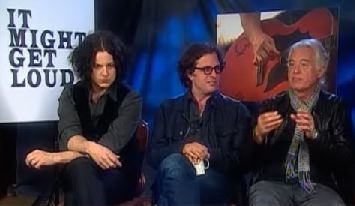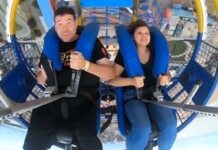 Jimmy Page, Jack White and The Edge unite in Davis Guggenheim’s new documentary ‘It Might Get Loud’. Filmed through the eyes of three virtuosos from three different generations, audiences get up close and personal, discovering how a furniture upholsterer from Detroit, a studio musician and painter from London and a seventeen-year-old Dublin schoolboy, each used the electric guitar to develop their unique sound and rise to the pantheon of superstar.
Jimmy Page, Jack White and The Edge unite in Davis Guggenheim’s new documentary ‘It Might Get Loud’. Filmed through the eyes of three virtuosos from three different generations, audiences get up close and personal, discovering how a furniture upholsterer from Detroit, a studio musician and painter from London and a seventeen-year-old Dublin schoolboy, each used the electric guitar to develop their unique sound and rise to the pantheon of superstar.
It Might Get Loud opened Friday in New York and California, and opens in coming weeks across the U.S. and the world.
A Review By Michael Ventre
The guitar has become almost as much a symbol of goodwill as the peace sign or the clasped handshake, yet there was still some doubt lingering in the cosmos above a soundstage on the Warner Bros. lot in January of 2008 when Jimmy Page, The Edge and Jack White came together for a six-string summit.
“It was nice to have a bold idea like that,” noted Davis Guggenheim, the director of “It Might Get Loud,” a documentary about the electric guitar that focuses on the aforementioned cross-generational trio. “But when it finally happened, I felt a little panicked and wondered, ‘Maybe they’ll storm off. Maybe they’ll get mad at me. Maybe they’ll have nothing to say.’”
Fortunately for Guggenheim, his collaborators and an eager guitar community, there was no ka-bonging of Les Pauls over heads in anger. Instead, after a brief feeling-out period, the three connected like old school chums and proceeded to exchange both pleasantries and toasty riffs.
Page, Edge and White clearly are three deities of the ax, but bringing them together for “It Might Get Loud” helps to illustrates the larger reality that when guitarists gather, even if they haven’t met before, they become close friends almost immediately.
“Like any other human being, sometimes it doesn’t happen,” said Thomas Tull, the producer of the film and an accomplished player in his own right. “But there is an unspoken language and an interest. There is that camaraderie. You try to chase that elusive, perfect sound. You at least have that shared context with another guitarist, everything from gear and equipment to sound.”
Transcending Ego
The three guitarists were chosen because each represents an era. Page, who is also an associate producer on the documentary, needs no introduction. His legacy, topped by the Led Zeppelin years, has inspired scores of actual guitarists and even more of the air variety. The Edge (real name: David Evans) is U2’s sound architect and gadget aficionado. Jack White is best known for his work in the White Stripes, and his guitar work is deeply rooted in the rich mud of American blues.
![]() Although they had met each other in passing before, relationships among the three did not exist until the filmmakers got them all together on a soundstage after an elaborate plan was devised and carried out to make sure they all arrived separately.
Although they had met each other in passing before, relationships among the three did not exist until the filmmakers got them all together on a soundstage after an elaborate plan was devised and carried out to make sure they all arrived separately.
“I did not want them to talk beforehand,” said Guggenheim, who also directed the Al Gore film “An Inconvenient Truth.”
Egos certainly exist in music, as in all other creative endeavors. But there is something about the guitar that causes players to put aside any chips that may be residing on shoulders, let down their defenses and open up their hearts and minds.
Jorma Kaukonen has seen this phenomenon occur more times than he can count. He was the lead guitarist for Jefferson Airplane in the late 1960s and early ‘70s, as well as the offshoot band Hot Tuna with bass player Jack Casady (they’re still at it today). But he began playing as a teenager in the ‘50s. And since shortly after 1989, he has run the Fur Peace Ranch, a camp in Ohio where devotees gather to pursue their passion for the guitar through instruction and informal jams.
“No instrument says community like the guitar,” Kaukonen said. “The intrinsic personality of the instrument transcends genre. The guitar, by its nature, is filled with personality and imperfections that all players share.”
Kindred Spirits
Naturally, all musicians have a kindred spirit, regardless of style and category. But what is it about the guitar that caused a rock god like Eric Clapton to have become close friends with Jimi Hendrix and Duane Allman, who were fellow stars but also rivals?
“The guitar is, and has been for fifty years now, the most popular instrument, played by the most people,” noted G.E. Smith, a torrid blues-rock performer who led the “Saturday Night Live” band for 10 years. He has played with artists as varied as Bob Dylan and Hall and Oates and is now the lead guitarist for Moonalice. “By far it’s the most widely played instrument in human history. It probably comes down to portability and that both chords and melody can be played simultaneously.”
Smith said the guitar represents a unique form of expression and communication that helps to connect those who might otherwise not connect. “Music is just another language, like Spanish or English,” he said. “It can be expressed simply or with as much subtlety and nuance as a particular musician is able to wield.
“When people get together to play music, all you need are ears and instincts. Most of the other nonsense that impedes human interaction falls away.”
‘A World Where No Words are Used’
When the filmmakers put together their wish list of the three guitarists they’d most like to see trade licks, compatibility like the kind you might find in a romantic comedy was not a priority. In fact, just the opposite.
“I wasn’t thinking so much about how they’d get along,” Guggenheim said. “If anything, I was thinking where their differences were. I do television and movies also, and the last thing you’re looking for in terms of onscreen chemistry is people who are already in love. You kind of want the natural chemistry of two people who have this energy, some of it is attraction and some of it is the differences that need to be resolved. There is great onscreen tension that comes from oppositeness.”
There were no flowers or valentines exchange during the first few slightly awkward moments when Page, The Edge and White finally got together. But the next best thing occurred.
“No one said, ‘I’m going to play,’” Guggenheim recalled. “All the tension broke when Jimmy, instead of answering one of Edge’s questions, stepped back behind a chair, picked up a guitar and started to play, ‘Whole Lotta Love.’ You could see on Jack and Edge’s face they were blown away.
“These guys express themselves in a world where no words are used.”
Said Tull: “My own opinion is that they immensely enjoyed themselves and liked being around each other. There was a bonding that seemed pretty genuine.”
Of course there was. After all, they’re guitar players.
_____________________________________________________ Full Film Trailer Below
The author of the review, Michael Ventre, lives in Los Angeles and is a regular contributor to msnbc.com. (Copyright 2009 by MSNBC Interactive News, LLC. Reproduced with permission of MSNBC, via Copyright Clearance Center.)



















